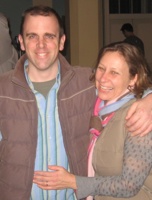10 Questions for Jon and Jo Soper
I recently caught up with Jon and Jo Soper. Three years ago they were sent out by St Marys London to plant a church in Exeter. The outcome has been the birth of the Exeter Network church.
1. How'd you get into church planting?
For many years we had a conviction that if the church can multiply itself in diversity it could reach a diversity of people. I found church monochrome. One size fits all wasn't working. I wanted to lead a church that would be normative in fifty years time. I wanted to develop a church model of diversity reaching a diversity of people.
Jo and I were on staff as associate vicars at St Marys London when the opportunity to plant a church in Exeter arose.
2. How has it gone?
We've just come through a ‘bloody phase'. After our initial gathering phase we were confronted with some serious pastoral issues.
Three of our young people were diagnosed with cancer and a young woman in the church who took her own life. All of this happened around the same time in the second year of the church plant.
I remember a significant moment feeling at my lowest. I had just visited the mother of the young woman who committed suicide. I followed that with a phone call to one of the young woman's friends to tell her that her friend had died. Her friend was one of three people diagnosed with cancer—a very aggressive cancer.
I had to inform her that her closest friend had not only died but had taken her own life.
3. What hit you at that moment?
I felt, “Is everyone going to get slaughtered here?†Three with cancer, now a suicide. Most of these people were part of the core group of our church plant.
4. How did you get through that?
I'm not sure if we're through it yet. But this is how we're getting through it.
The community of believers are called towards each other at a time like this. The situation has increased the love and care between our people. There has been a lot of prayer—public prayer, prayer for one another and prayer for those who are suffering.
Looking outwards has also been important. We've kept our mission before us.
We recognize that we are all broken but we are all engaging with God's agenda for the world.
5. How have you seen God at work?
We've seen God at work touching people's lives who are not yet Christians. We encourage all our people to ask people, “Can I pray for you?â€
Two examples come to mind:
A woman came to an artist in Exeter to have her portrait painted. The artist's wife, Joy, attends our church. As part of the process of having her portrait painted, the woman shared her story. It was a story of relationship breakdown and heartache.
Joy asked, “Can I pray for you?â€
A couple of days later the woman called back and told her, “This prayer stuff works! My life has been transformed. I can't believe it, but God forgives me for my past life.â€
We have another woman, Betty, who works in local government. Someone in her office became gravely ill and was taken to hospital. Betty didn't know the woman well but overheard someone say, “This woman needs a miracle!†So she went to the hospital and laid on hands and prayed for her to recover.
There was no improvement and it looked like she would die.
The office boss, an atheist, heard Betty had been to the hospital and prayed for the woman. She asked Betty to go back to the hospital and pray for her again.
The woman was eventually released from hospital and visited the office. She made a beeline for Betty and a gave her a huge hug. Then she turned to the rest of the office and shouted, “It's God, God has done this!†She's not out of the woods yet. But she's alive and thanking God for that.
God has used Joy and Betty in amazing ways because they made themselves available.
That's why we continually encourage all our people to go out into the highways and byways and ask, “May I pray for you?â€
6. What are you learning about church planting?
I'm learning we're at our best when we don't know what we are doing. I like setting up patterns and rhythms for ministry. God sometimes says, “Forget your systems. Forget your strategies. I want to do it.â€
My job as a church planter is to create a framework that gives enough coherence to our ministry without boxing in God. Part of me wants to control what happens. What we need is a framework with enough freedom to see God work through his people.
7. What does Network church look like?
As a church we want to be strong at the core, blurred at the edge. We're committed to discipleship and grace.
The basic structure of our church are 4mation groups. Four people meet for an hour each week. That share how they are following Christ and what they plan to do this week to follow Christ. It's like a spiritual gym card. A plan backed up by accountability.
We have two congregations that meet most weeks in a school. A total of about 250 people attend weekly.
We also have a group of about twenty that meets in a fish and chip shop in a housing estate in a local village. They're doing Alpha weekly. Once a month they worship in the preschool. It's called “God and chipsâ€. Just recently they've distributed 850 fliers throughout the estate inviting people to come along for a free bag of chips to hear about Alpha.
We're in conversation with a Christian social action group in another housing estate. They're highly respected for the work they have done in the estate. We want to support the good work they are doing and help them build a worshipping community in the estate.
8. What else do you do?
Once every month or two we have “Edge Sundayâ€. We stop our regular Sunday gatherings and encourage everyone to get out into the community.
Here's what they do:
a. Social events
Our people run tennis tournaments, they host meals, they organize jogging groups.
b. Serving the community
Recently a group of our people baked a bunch of cakes for the elderly and distributed them. Some of our folk were deeply challenged by the experience.
c. Prayer walking
They walk the streets and pray for the community and community institutions like the police and universities.
d. Prophetic evangelism
This is only for the brave. They visit cafes and pray for the people they see there. They ask God to speak through them to these folk. Sometimes they sense him speaking and they ask permission to share what God is saying. You'd be amazed how positively people respond.
The week after Edge Sunday we gather again and tell the stories of what God has done.
It's all part of a continuing process of turning people outward. Many of our people were ‘de-churched' before they came to us. You've got to turn them outwards.
9. What's your relationship with the Anglican church?
We were planted with the help of St Mary's London and we are part of the network of St Mary's churches.
Initially we held discussions with a representative of the diocese about planting the church as an Anglican church. They wanted to wait a few years. We were ready to go. So we had to start up independently, even though I am an ordained minister with the Anglican church.
We are still working toward formal recognition as an Anglican church. The Bishop of Exeter has just decided to give me permission to officiate in this diocese. He has also agreed to designate us as a misson order of the Anglican church. It's a new concept just approved by General Synod which allows a bishop to find a mission priest and plant them in any parish, even if a local church objects.
10. How has being a part of the St Marys network of churches helped?
Having a “mother ship†supporting us has been crucial. The most valuable aspect has been the friendship we have with St Marys and the growing number of churches in the network in Britain and around the world in New Zealand, Uganda, the US and Germany.

